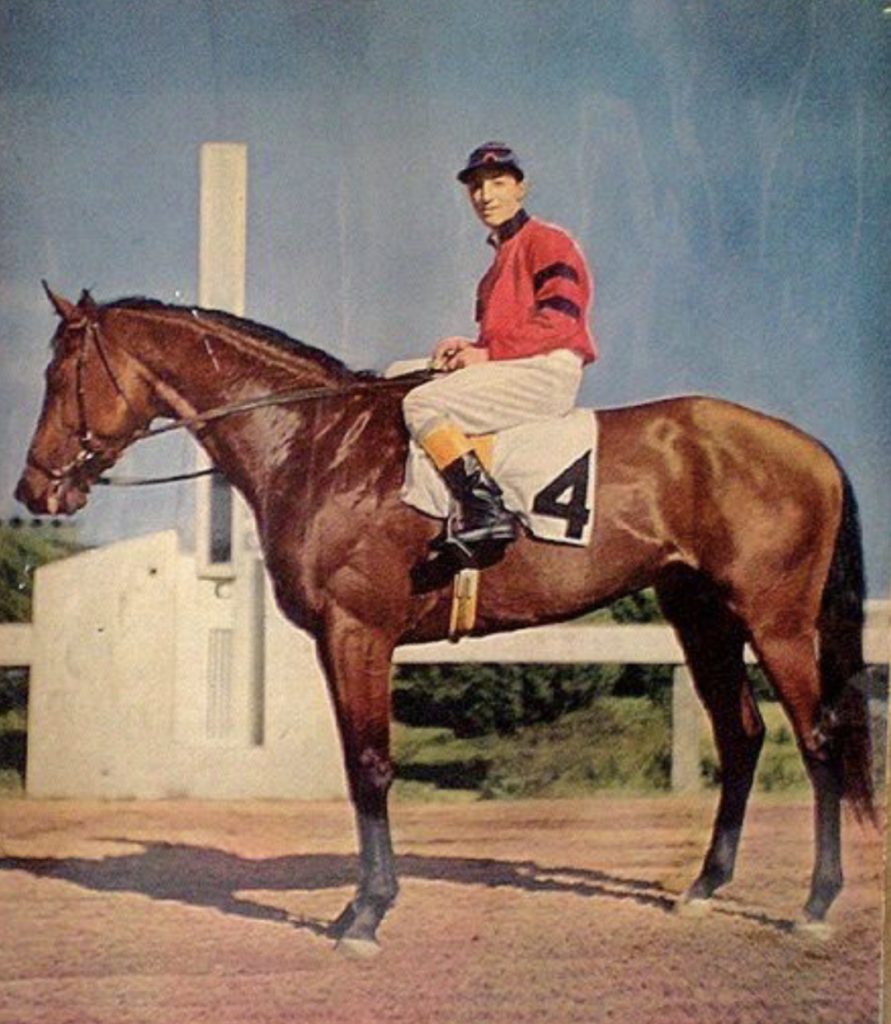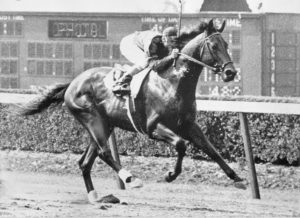
A Stamp of Greatness: Citation
By Nick Costa
In 1978, when Affirmed crossed the finish line by a head in front of Alydar in the Belmont Stakes to sweep the Triple Crown, thoroughbred racing and its audience could not foresee a plunge into an abyss of nearly four-decades before the sport would witness a horse win all three races again. The country suffered through a lengthy period between drinks of water before American Pharoah quenched its thirst again by ending the prolonged absence, and with it, set off a long awaited, wild celebration at Belmont Park in 2015.
The 37-year span that racing fans endured, was the longest interval between Triple Crown Champions.
The previous record was 25 years. The quarter-century drought ended in 1973 when a chestnut colt named, Secretariat, brought the thoroughbred world out of its doldrums and restored order in the Triple Crown series by winning all three races and setting records in each for final time. He also established the winningest margin in the history of the Belmont Stakes, probably never to be broken again, with a 31-length victory.
Secretariat, or ‘Big Red’, as he was commonly referred to, was the first racehorse to win the Triple Crown since Citation accomplished the feat in 1948.
Citation raced under the ownership of Calumet Farm, one of the most successful racing and breeding operations in the world during its heyday and was trained by the father/son team of Ben and Jimmy Jones.
The bay colt displayed his flair and aptitude as a two-year old winning his debut at Havre de Grace racetrack in Maryland. He would go on to win eight of nine starts during his juvenile season, with his only loss coming against, Bewitch, his Champion two-year old filly stablemate. For his accolades in 1947, Citation received two-year old Champion colt honors.
Early in his three-year old year, Citation defeated his stablemate Armed, the older Horse of the Year in 1947. Hardly ever did a three-year old challenge, let alone defeat, older runners so early in the season.
Citation proceeded to win 28 of his first 30 races. He suffered a single defeat during his three-year old season to a horse named, Saggy, but the loss would be quickly eradicated when Citation soundly defeated that opponent five days later in a subsequent race.
Ironically, the loss to Saggy coincided with the first appearance of jockey Eddie Arcaro aboard Citation. Arcaro, already with three Kentucky Derby wins and a Triple Crown (Whirlaway-1941) to his credit, picked up the mount after Albert Snider, the rider who piloted Citation on a regular basis, disappeared during a fishing trip in March off the Florida Keys.
It would be the last time Citation would lose a contest for nearly two years.
During a stretch of twenty-one months, beginning in April 1948 and extending to January of 1950, Citation won 16 consecutive starts, 13 of which were stakes. Three of them being the coveted Triple Crown races.
In his 1948 sweep of the Kentucky Derby, Preakness and Belmont Stakes, Citation won the series with a commanding presence of authority.
His quest began at Churchill Downs, in Louisville, Kentucky on May 1st, 1948. Heavy rains had fallen overnight and left the track sloppy for the 74th edition of the ‘Run for the Roses’. Citation and his formidable stablemate, Coaltown, both sired by top Calumet stallion, Bull Lea, practically kept the opposition away, as only four challengers showed up in Louisville to face the daunting duo. It was just a matter of which horse Calumet was going to win with.
While Citation sported a sparkling resume, Coaltown was a star in his own right. He had won the Blue Grass Stakes prior to arriving at Churchill. If anyone could beat Citation, it was he. Some of the local media and fans viewed Coaltown as the better horse. Even Arcaro, had his doubts if his mount could beat Coaltown.
Blazing speed was Coaltown’s forte and he used it to open up a six-length lead down the backstretch. As the horses went into the turn for home, Arcaro gave Citation his cue, and the horse responded. Citation steadily gained and soon the two horses were stride for stride down the stretch, before Citation edged ahead and was gone, winning comfortably by 3½ lengths.
Arcaro gave the widow of former jockey Al Snider a share of his Derby purse money.
In Baltimore, none of the Derby horses showed up because Citation had scared them all away. Three opponents had to be found to run against him in the Preakness. Citation was once again impressive as he led wire-to-wire, winning by a widening margin of 5 ½-lengths. Racing fans at home were able to watch the performance too, as the race was televised for the first time.
Citation now stood on the brink of racing history. There was one final hurdle on the Triple Crown docket, the Belmont Stakes in New York.
However, there was a four week break between the second and third jewel, and it was determined that Citation would need a race before running a grueling mile and a half, so he was entered in the mile and a quarter Jersey Stakes at Garden State. In his tune up for the Belmont Stakes, Citation romped by 11-lengths going wire to wire in track record time.
At Belmont Park, Citation, leaving from post position one, stumbled badly. Arcaro managed his best gymnastics to stay in the saddle and ‘Big Cy’ gathered himself and hit his stride, taking the lead at the quarter-pole. Through the stretch, he galloped easily and crossed the wire eight-lengths in front to become America’s eighth Triple Crown winner.
Later in the year, Citation had no challengers in the Pimlico Special. Arcaro simply galloped the horse around the oval in what is considered in racing terminology as a ‘walkover’.
Citation was named 3-year old Champion Horse and Horse of the Year in 1948.
An osselet on his left ankle kept Citation out of competition in 1949.
Upon Citation’s return in 1950, the riding assignment fell to Steve Brooks, and Citation won for the first time in 13-months to make it 16 straight. The streak would end two weeks later at Santa Anita when the Argentine-bred Miche was a neck better in a six-furlong event. Miche went on to win the Santa Anita Handicap in 1952.
Citation contested nine races during the 1950 season, with either a new track or world record established in six of them. Citation set one and finished second in the other five. Four of the runner-up finishes came against, Noor, the English import. The encounters against each other turned into one of the most famous rivalries in racing history.
By the end of his five-year old campaign, it was apparent that Citation was a different horse, a bit diminished due to his earlier injury. However, there were no talks of retirement.
With ailing Calumet owner Warren Wright setting his sights on having his ace colt become the first horse to reach $1 million in earnings, the horse was kept racing as a six-year old. But winning was becoming difficult for Citation and it appeared Wright’s goal would not materialize after Citation lost his first four starts.
Then in mid-June, Citation put together a three-race winning streak that climaxed with a win in the 1951 Hollywood Gold Cup in his final start, vaulting him past the $1 million mark in earnings and he was retired to stud.
Citation exited racing the same way he entered the sport, on a winning note.
Citation, inducted into the Racing Hall of Fame in 1959, won 32 of 45 career races and finished in the money in all but one of them. But more than his record, it was the colt’s relentless will to win
A remarkable equine athlete with an abundance of intelligence and talent, Citation could lead, stalk or come from behind and turn it on whenever necessary. His versatility was extremely intimidating.
There wasn’t any flamboyance to Citation’s execution on the racetrack. He did not go out and try to win by any great amount of lengths, he just went out and beat everybody that showed up.
Citation passed away in 1970, three years before the country witnessed its next Triple Crown winner.
Citation was the best race horse since Man O’ War and the best one until Secretariat twenty-five years later.
The three are easily a consensus choice as the greatest trio of race horses to compete in North America during the 20th century.
How good was Citation? Eddie Arcaro said the horse was the best he ever rode. Arcaro, the only jockey to win two Triple Crowns, five Kentucky Derby’s, six Preakness’ and six Belmont’s, in a career that spanned three decades. The best he ever rode?
Yes, that was Citation.




